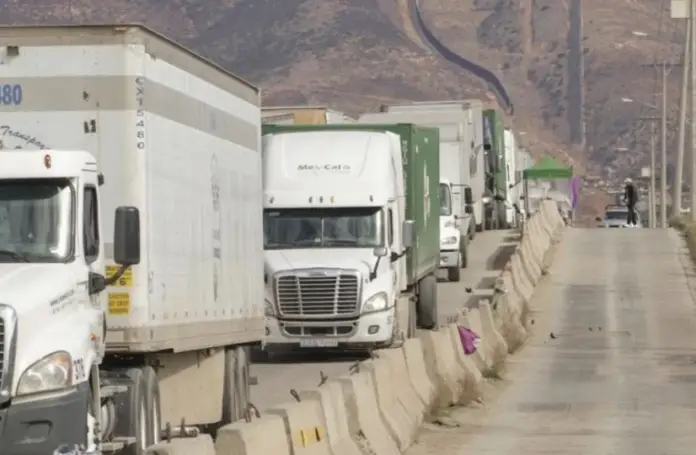Exporters in Mexico face queues of up to eight hours to cross the border with the United States, after the activation of security protocols and documentation inspection in Tijuana on Friday, in response to measures by US President Donald Trump.
These protocols were carried out exclusively in the export lane where heavy cargo transport transits, at the Otay border port, generating long queues of up to 38 kilometers and traffic chaos in the surrounding areas.
Israel Delgado Vallejo, vice president of the National Chamber of Cargo Transportation (Canacar) in the northwest region of Mexico, explained that these actions have to do with security agreements on the border between the country and the United States.
“It is a protocol that is carried out with little advance notice and is combined with the updating of the exporters’ documentation and the maintenance of the computer system, which has generated all this chaos,” he told the media.
Delgado explained that, in addition to the exhaustive review measures, the National Customs Agency of Mexico (Anam) implemented a new Digital Document Repository (Repadi) in the Single Window for Foreign Trade (Vuce), to deal with contingencies at the border.
He said that generally at this window, at the time of crossing, all the importers’ documents were presented physically, but now what is proposed is a digitalization so that there is no loss of information.
“The process will be more efficient at a given time,” he said, but questioned that, with the measures carried out, “tests should have been done much earlier, because there are still failures in the system and this has further complicated” the transit.
Regarding the chaos generated and the long waiting lines, Delgado predicted that it will be temporary while the maintenance stage is carried out, because it is a contingency stage, which is being analyzed with Anam to measure the impact that all this can cause.
“Today we are in a month in which production is typically still very low and we hope that this does not have a very large impact on exports. We hope that after this contingency the flow can be resolved,” said Delgado.
Regarding the negotiations in this area between the Mexican president, Claudia Sheinbaum, and her American counterpart, Donald Trump, he considered that if the 25% tariffs were applied to all Mexican products, “the manufacturing industry would be affected and would dramatically slow down exports.”
He said that they are waiting, but also “confident of what may happen, because there is a great team of negotiators covering President Sheinbaum.”
“The Mexican industry is on the alert, even though we have this situation, we celebrate that time has been gained because this is a respite to be able to react to the agreements,” Delgado said.

Source: latinus.us




